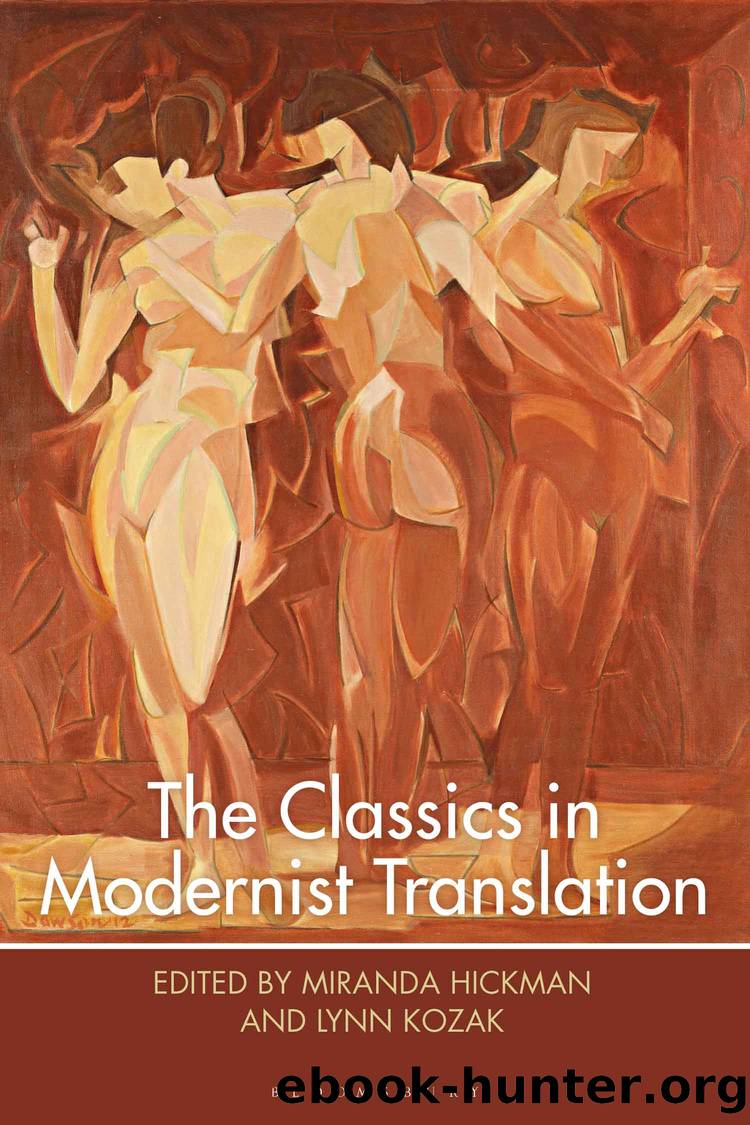The Classics in Modernist Translation by Lynn Kozak;Miranda Hickman;

Author:Lynn Kozak;Miranda Hickman; [Kozak, Miranda Hickman and Lynn]
Language: eng
Format: epub
ISBN: 9781350040977
Publisher: Bloomsbury UK
Published: 2018-12-10T00:00:00+00:00
That I have written only a novel, a tentative prose account of this first concentrated world-experience, should be taken as my apology of its faults of fact and truth. A novel, whatever its faults, has a least the endearing virtue of homeliness. And it is the homelier aspects of the story of Troy that call for understanding.
1937: xiiâxiii
Through the genre of fiction, prose and the prosaic, Riding finds herself âat homeâ in history by envisioning the past through domestic details and common life experiences. Even her choice of language is cued to the familiar, as when she states that she will choose the Latin word form over the Greek, for its âmore accustomed ringâ and English derivations over the original, as in âDiomedesâ over âDiomedeâ â âfor its homelier, less poetical ringâ (1937: xiii).
A Trojan Ending is an accounting of the final year of the legendary battle between Troy and Greece, culminating in the destruction of the ancient Trojan citadel. Ridingâs novel is less an epic and more a drama of the personalities, relationships and key decisions that impact events. She animates and, in some cases, reinstates Trojan and Greek women, and she amends their depictions as well as those of attendant classical men.16 Ridingâs modernist retelling accentuates domestic spaces over battlegrounds, as sites for dramatic action: royal boudoirs, the Scaean viewing tower and camp tents are alternative locations of influence where women are present and relatively free to speak. Most pointedly, Riding engages the narratives surrounding two legendary women, Helen and Cressida, who are conventionally depicted as traitors to men. While the architecture of the elopement of Helen and Paris and the medieval and Renaissance Troilus and Cressida plots are maintained, she reworks the womenâs characters and motivations for their decisions. Riding offers Helen and Cressida as contrasting portraits of the traditional and the New Woman. Ridingâs Helen is virtuous yet resigned to the fate that her flight from her husband Menelaus brought. She wears a âdo-with-me-as-you-like lookâ (1937: 49), while Cressida is intellectual, ethical and decisive on her own behalf: she is âalmost in her time what woman may be in oursâ (1937: 410). Cressida gently rejects Troilus as a romantic partner, for he is portrayed as unpredictable and moody (arguably stereotypical female temperaments). Instead, she chooses the brave and thoughtful Diomedes as a suitable match for her. Cressida is the hero of this tale, as her allegiance to Troy propels her first to volunteer to serve as a hostage during a truce with the Greeks â at which time she collegially confers with Achilles â and then to survive the destruction of Troy in order to preserve the memory of Trojan culture (which includes worship of the powerful mother goddess Cybele, who is contrasted with the Greek Apollo).
Cressida stands for Riding as a forceful personal progenitor, as she states in her preface (1937: xviii):
Download
This site does not store any files on its server. We only index and link to content provided by other sites. Please contact the content providers to delete copyright contents if any and email us, we'll remove relevant links or contents immediately.
The Power of Myth by Joseph Campbell & Bill Moyers(1049)
Half Moon Bay by Jonathan Kellerman & Jesse Kellerman(979)
Inseparable by Emma Donoghue(976)
A Social History of the Media by Peter Burke & Peter Burke(968)
The Nets of Modernism: Henry James, Virginia Woolf, James Joyce, and Sigmund Freud by Maud Ellmann(890)
The Spike by Mark Humphries;(805)
The Complete Correspondence 1928-1940 by Theodor W. Adorno & Walter Benjamin(773)
A Theory of Narrative Drawing by Simon Grennan(773)
Culture by Terry Eagleton(770)
Ideology by Eagleton Terry;(731)
World Philology by(711)
Farnsworth's Classical English Rhetoric by Ward Farnsworth(710)
Bodies from the Library 3 by Tony Medawar(707)
Game of Thrones and Philosophy by William Irwin(707)
High Albania by M. Edith Durham(697)
Adam Smith by Jonathan Conlin(685)
A Reader’s Companion to J. D. Salinger’s The Catcher in the Rye by Peter Beidler(675)
Comic Genius: Portraits of Funny People by(648)
Monkey King by Wu Cheng'en(645)
